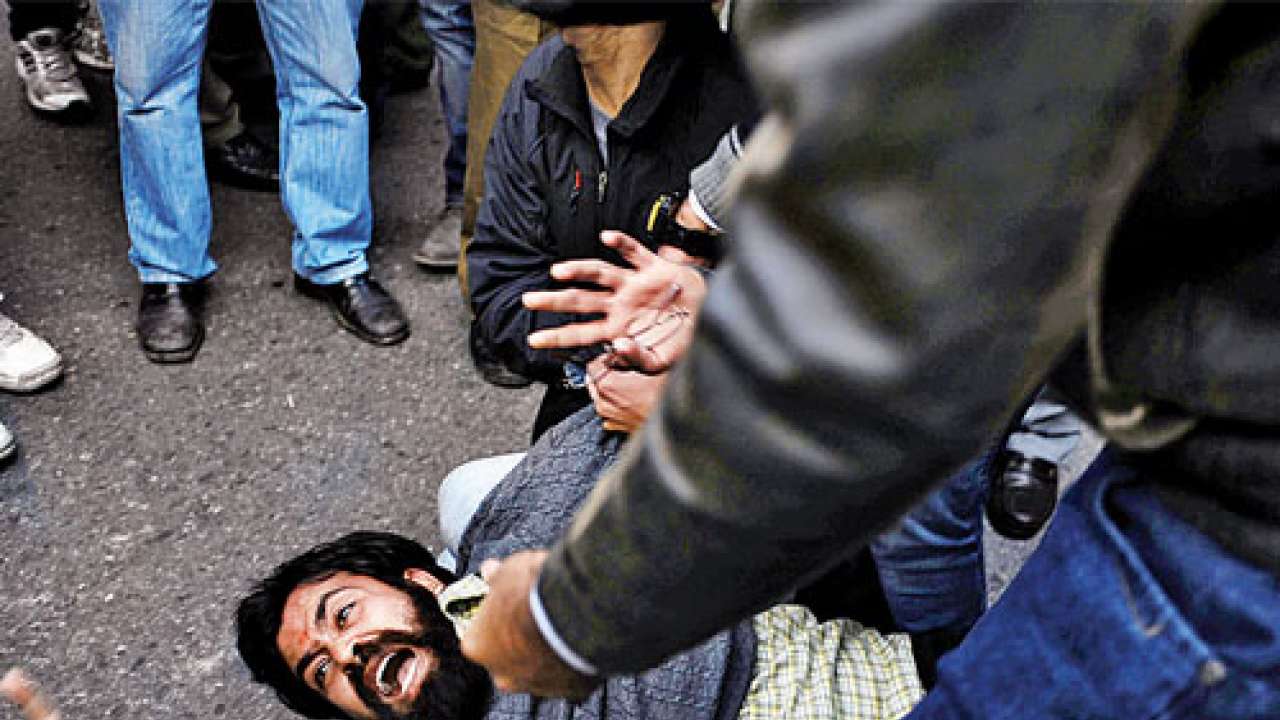
On Tuesday evening, the Chief Minister of Delhi, Arvind Kejriwal, ended one more high-pitched protest. At the end of it, two police officers were sent on leave, pending judicial investigation. The seeds of the drama were sown when the newly appointed law minister of Delhi, Somnath Bharti, decided to take the law into his own hands. Aggrieved at what he believes was police neglect, he and his supporters held up Ugandan women, assaulted them, subjected them to a humiliating body search, got them to give urine samples in public — and then threw a hissy fit when people objected to their behaviour.
Bharti’s contention was simple. There is a drug menace in the locality he serves, Africans are associated with drugs, ergo, Ugandan women who are also Africans must also be drug pushers, involved in prostitution and guilty by virtue of their race. Confronted with dissent, from an otherwise fawning media, Bharti became shrill, even threatening to spit on the lawyers —Arun Jaitley and Harish Salve — who had dared to question his behaviour and represent the women.
In any other organisation, Bharti would have been pulled up and reprimanded. However, the Aam Aadmi Party (AAP) is not just another organisation. It is the self-styled representative of the common man (not woman). It has a sense of self-righteousness and moral superiority that makes it believe that its members have the right to do whatever they deem fit, and anyone who questions this is morally inadequate and compromised. Therefore, rather than taking action against the overzealous minister, Kejriwal took to protesting against the police and Union home minister Sushil Kumar Shinde, and sitting on dharna outside Railway Bhavan. AAP’s demand was simple — transfer the policeman who dared to offend the minister. When accused of anarchy, Kejriwal said in a statement to the press, “They say I am an anarchist. Yes, I am. Today, I will create anarchy for Mr Shinde.” Part of the protest was a threat to disrupt Republic Day celebrations. Again, Kejriwal had a well-crafted sound byte, “Republic Day does not mean people enjoying tableaux at Rajpath... it means the rule of people.”
The problem of setting yourself up as morally higher than mere mortals is that logic, rationality and the rule of law go for a toss, and the demands of the party become the demands of not just those who support it, but the demands of all citizens in general. India is a constitutional republic, where elected representatives exercise power on behalf of the people and within the rules laid down by the Constitution. While protest is a right guaranteed by the Constitution, protesting without negotiation is childishness. The behaviour of the Aam Aadmi Party over the last week has been akin to children throwing a tantrum after being told that they cannot have an extra helping of sweets. It is not the behaviour that one expects of elected representatives.
There are multiple problems that India faces. A system that is infected by corruption, a political class that is arrogant in its approach to the issues facing common people, large business that tries to subvert the system by collusion, an administrative system that gives citizens the run around. In all of this, a party that claims to stand for the interests of the aam aadmi and speaks up for their concerns and issues is an obvious attraction. However, a ruling party taking to the streets in protest against policemen not bending to the will of a minister is less about the general will of the people and more about the hubris of power and the imposition of will and wilfulness on the system.
That citizens of India (or Delhi) want to live in a safe and secure environment, without being bothered by drug addicts, drug pushers and commercial sex workers, is not being questioned. What is being questioned is the presumption of guilt and vigilante action to tackle this guilt. The excuse given is that it is a new party, give them time. The problem with giving a free pass to a new party, or anyone else, is that you are condoning mob action that deprives individuals of liberty, in the name of keeping ‘society at large’ safe. If behaviour like this is not checked, then tomorrow, it could be your liberty and dignity at stake.
BR Ambedkar in his famous speech to the Constituent Assembly in 1949, said, “The second thing we must do is to observe the caution which John Stuart Mill has given to all who are interested in the maintenance of democracy, namely, not ‘to lay their liberties at the feet of even a great man, or to trust him with power which enables him to subvert their institutions’. …As has been well said by the Irish patriot Daniel O’Connell, no man can be grateful at the cost of his honour, no woman can be grateful at the cost of her chastity and no nation can be grateful at the cost of its liberty.”
The first thing, of course was the need “to hold fast to constitutional methods of achieving our social and economic objectives. It means we must abandon the bloody methods of revolution. It means that we must abandon the method of civil disobedience, non-cooperation and satyagraha. When there was no way left for constitutional methods for achieving economic and social objectives, there was a great deal of justification for unconstitutional methods. But where constitutional methods are open, there can be no justification for these unconstitutional methods.
These methods are nothing but the Grammar of Anarchy and the sooner they are abandoned, the better for us.”
Dharnas and drama are great for television viewing, wonderful for ratcheting up the pitch, and increasing audiences for TV news — but the question we all need to ask (and answer) is, what is the cost to the Republic of India?
The author is Head, Digital – Zee Media Corporation